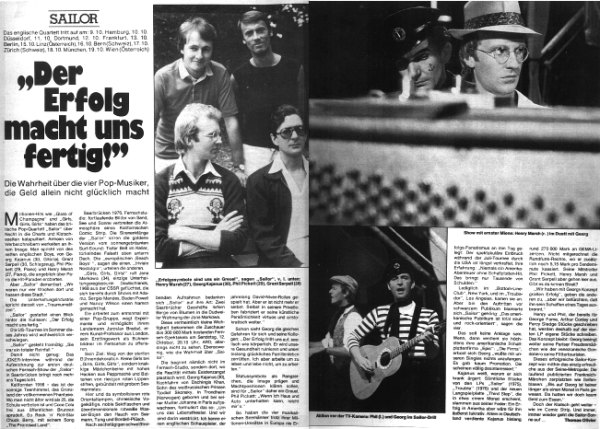|
Scrapbook
|
|
Scrapbook
|

Taken from "Joker" 21/1976
SAILOR -
"The success is tiring for us!"
The truth
about the four pop-musicians who are not happy just because of
their money
Million-selling hits
like "A Glass Of Champagne" and "Girls Girls
Girls" have brought the British pop-quartet SAILOR to the
top of the charts and the gossip-magazines over night. Many
promoters are working on their image. People are talking about
the nice English boys Georg Kajanus (30, guitar), Grant Serpell
(30, drums), Phil Pickett (29, piano) and Henry Marsh (27, piano)
who have allegedly started to enter the charts in Paris.
But SAILOR deny it: "We have only been there for four weeks
and we hate this city."
The entertainment-industry is talking about
"dream-sales".
SAILOR allow us a view behind the scenes: "The success is
tiring for us."
They probably know why they rather don't want to talk about the
US-tour this summer. SAILOR admit: "It was a total
flop."
That was not enough. The "Joker"-interview during the
recording of the first German television show of SAILOR in
Saarbrücken reveals a lot more.
California 1966 - the sunny teen-heaven of real fantasies. Where
you never get older than 25, school is forbidden and Coca Cola
comes out of every public sparks. That's what Rock 'n Roll star
Chuck Berry once promised in his song "The Promised
Land".
Saarbrücken 1976, television studio: Pictures of sand, sea and
sun create an atmosphere of a California comic-strip. The fog
horns of SAILOR start the golden vision of sun-tanned skin and
surf-sound: Deep bass. Some call them the "European Beach
Boys", others judge them with "trivial nostalgia".
"Girls, Girls, Girls!" shouts Jana Markova (34), the
only real entertainment-director in Germany who left the CSSR in
1968 and has already worked on numerous shows with artists
including Adamo, Sergio Mendes, Baden Powel and Nancy Wilson.
For the first time she works with a pop band, dares an experiment
and makes it possible for compatriot Jaroslav Bradac to create
his first official stage-set for television.
His aim: To get away from the usual sterile stage decoration. No
girls in "Girls Girls Girls", but girls' legs with high
heels made of pasteboard and lots of huge red lipsticks and
ropes.
Here and there symbolic red oriental lamps, Chinese bird-cages,
champagne-bottles and over dimensional red and white water-buoys,
a bit of sailor-tang and red light quater atmosphere.
After six busy days of recording SAILOR thank in their very own
way: Two shops from Saarbrücken bring lots of flowers to the
flat of Jana Markowa.
The people who see the 300.000,00 DM television special don't
know about this special little gesture on the day of broadcast,
the 12 October 1976, 21:15 pm on ARD television. They don't get
to know the truth about SAILOR either.
The truth doesn't start in the television studio, it starts where
the reality becomes clear through existence-fears. Georg Kajanus
(30) a descendant of Dschingis Khan, son of the Belarussian
prince Tjodief Skonsky, born in Trondheim (Norway) and grown up
with his mother Johanna in Paris, explains it like this:
"Around us there's the theatre of life. And we are right in
the middle of it. I know an English actor who used to play
David-Niven-rolls for many years. But he's not himself anymore.
Even in private life he keeps on playing the role of an artistic
person masterly and aristocratically."
And Georg sees the same danger for himself and his colleagues.
"The success eats us up, the souls and the bodies. It might
ruin our health and even our happy family-lives. I work in order
to live and not in order to work."
So SAILOR detest tatus symbols that underline the image and
power. Phil Pickett: "When I can afford a house and a car
it's enough."
The four musical SAILORs have never been too enthusiastic about
their success in spite of their million-sales in Europe. The
spectacular flop of the July-tour through the USA has quickly
been dealt with. Their experience: "Never an
American-adventure without a record hit. That only leads to
thousands of debts."
Only at the "bottom-Line-Club", New York and at the
"Troubadour", Los Angeles they did quite well. But all
concerts in front of black audiences failed: "The American
audience is totally into soul and rock", the four guys
explain.
That is no accusation. And if it was one it was only for the
blame of the American record company Epic: "The
company," explains Georg, "didn't know what to do with
our singles. There was no promotion. They seemed not to be
interested."
Kajanus knows why he is angry: All songs from the LPs
"Sailor" (1974), "Trouble" (1975) and the new
album "The Third Step" that will be released next month
have been written by himself. Success in America would be very
good for him. In Germany alone he earned approximately 270.000,00
DM with GEMA-licenses. This doesn't include the radio shows where
he gets 5,15 DM for every minute of broadcast. But his fellows
Phil Pickett, Henry Marsh and Grant Serpell don't receive any
royalties. Isn't there trouble?
"We are very successful with Georg's concept," the
others admit, "but we are afraid that his creativity might
be restricted one day."
Henry and Phil, who has already written songs for George Fame,
Arthur Conley and Percy Sledge, want to write own songs on the
fourth LP. The concept stays the same: Georg keeps on singing
about his Parisienne girls and prostitutes.
This successful SAILOR-concept was the only good thing from the
city near the Seine: The fairy-tales and stories about France
which were spread constantly burst like soap-bubbles:
"Except for Georg none of us stayed in Paris longer than a
month. There we didn't even have enough money for food."
But the gossip continues - like in a comic-strip. And the
SAILOR-sun will rise again and again...!